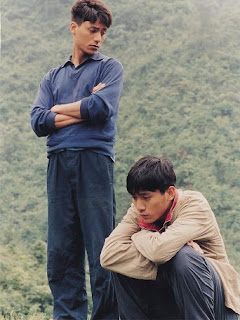Balzac and the Little Chinese Seamstress * * *
 Balzac and the Little Chinese Seamstress (DVD on Amazon)
Balzac and the Little Chinese Seamstress (DVD on Amazon)Not wanting to sleep the other night, I flipped through Netflix instant viewing and saw that "Balzac and the Little Chinese Seamstress" was available. The book is excellent -- a real page-turner. It tells the autobiographical story of two young men (about 19 yrs old) who are sent to a remote village in the mountains to be "re-educated" in the early 1970s. This was part of Mao's Cultural Revolution during which time he waged an all out assault on anyone with higher education, i.e. doctors, lawyers, musicians, engineers, writers, etc. They were labeled as "reactionaries" or "black elements". Their houses confiscated and property destroyed. They were forced into menial labor and all aspects of their lives constrained. In the late 1960s, Mao instituted the "Up to the mountains and down to the villages" policy. The children of the intelligentsia were sent away to be work in the countryside and not allowed to study. This period lasted 10 yrs and effectively exiled a entire generation.
 This film only touches briefly on the horror and degradation inflicted upon people by the Cultural Revolution -- during a scene in which one of the boys breaks down and cries. Instead it is a coming of age story about two boys, well young men. Luo, the son of a dentist, is handsome and witty. Ma, the son of a surgeon, is quiet and an excellent violinist (who later escapes to France and becomes a violinist in real life). One funny scene occurs in the beginning when the villagers are examining the boys stuff. They find the violin and are about to burn it, when Luo saves it and offers that Ma will play Mozart for them. "Hmm, Mozart, that sounds reactionary", says the village chief. "No, the song is 'Mozart is Thinking of Chairman Mao'".
This film only touches briefly on the horror and degradation inflicted upon people by the Cultural Revolution -- during a scene in which one of the boys breaks down and cries. Instead it is a coming of age story about two boys, well young men. Luo, the son of a dentist, is handsome and witty. Ma, the son of a surgeon, is quiet and an excellent violinist (who later escapes to France and becomes a violinist in real life). One funny scene occurs in the beginning when the villagers are examining the boys stuff. They find the violin and are about to burn it, when Luo saves it and offers that Ma will play Mozart for them. "Hmm, Mozart, that sounds reactionary", says the village chief. "No, the song is 'Mozart is Thinking of Chairman Mao'".The film follows about a year of their four years in the mountains. During this time, they are saved from the intellectual poverty of village life by a suitcase full of illegal Western novels -- Stendhal, Kipling, Dostoevsky, and ... Balzac. Such books were destroyed by the communists so were very hard to come by and obviously would be a one-way ticket to jail if discovered. They boys acquire the suitcase by stealing it from another boy, the son of a poet, who is being re-educated in a nearby village. These books change their lives -- and the life of a young woman, the granddaughter of the local tailor. The boys fall in love with her and decide to educate her by reading the books to her. This has a series of unexpected consequences and one of the themes of the book and film is the power of education to change a person. Although in this case, it is not education per se, but rather opening one's eyes to the existence of a wider world.
The film follows the book quite closely, but diverges at the end by telling us what happened to the boys. Ma leaves China and emigrates to France where he becomes a somewhat successful violinist. Luo becomes a dentist like his father. The little seamstress left for the city and eventually emigrated to Hong Kong. This adds nice closure that the film was missing.
Overall I found the film entertaining. I had not intended to watch the whole thing in one sitting (it was after midnight when I started watching), but I ended up doing so as I was so engaged.
Watched on Netflix instant viewing. Subtitled.
Labels: China, communist era

<< Home